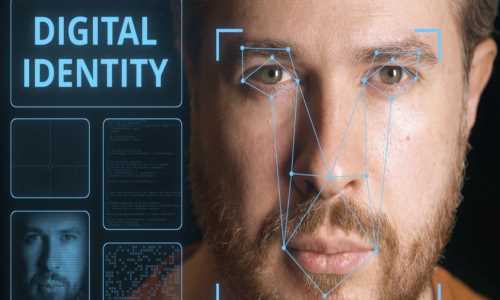Whether Through Biden, Harris, Or Trump — Digital IDs Are Coming to America

A recently leaked draft of an Executive Order shows the Biden Administration is considering expanding the required use of digital ID’s to fight fraud — a move that is being criticized by privacy advocates and civil liberties organizations. While Biden’s plans pertain to infrastructure for digital driver’s licenses, similar moves were made by former President Donald Trump under the guise of fighting illegal immigration.
Biden’s Executive Order was first reported on by NOTUS after the organization obtained a draft version. The draft viewed by NOTUS calls for federal and state governments to accelerate the adoption of so-called mobile driver’s licenses. “It is the policy of the executive branch to strongly encourage the use of digital identity documents,” the draft states.
Mobile driver’s licenses (mDL), or simply digital driver’s licenses are another form of digital identity rolling out across North America in 3 common forms. This includes proprietary apps owned by a local, state, or national government; various state-approved apps like SmartID; and the Apple Wallet, which 4 U.S. states are currently using to host their digital driver’s license.
According to a guide to digital driver’s licenses, users will open the chosen app, scan the front and back of their physical driver’s license, and then verify their identity with a selfie (or similar biometric data). Once verified, the user can began using their digital ID app as they would a physical ID card.
According to NOTUS, the draft order is aimed at addressing the loss of billions of taxpayer dollars relating to fraudulent claims to benefit programs using forged identification documents. The order would mandate federal agencies to adopt a “single government-run identity system, Login.gov, as a gateway to federal websites”. The same system would be offered to state and local governments as well.
If adopted this system would fundamentally change how Americans prove their identity online, file their taxes, and access certain websites and services.
NOTUS said they spoke with four people who have seen the draft EO and noted that the text is finalized but “the Biden administration was debating when to roll it out”. Another person told NOTUS the text was obtained from a federal agency, and another person who had seen the draft said it “matched a summary that had circulated among stakeholders within recent months”.
A White House spokesperson told NOTUS that, “Nothing is final until it’s signed by the president.”
The Biden Administration has been working on some version of this Executive Order since at least 2022, when Biden promised executive action during his State of the Union address. As recently as March, NextGov reported that Biden was still working on the order.
“We continue to work in this area very rigorously across government,” Clare Martorana, the federal chief information officer, told Nextgov at the time. “This is top of mind for all of us. We want to make sure that we accelerate people’s use of digital to access government, but safely, securely.”
NextGov also reported that Caitlin Clarke, senior director at the National Security Council, similarly outlined the Biden admin’s interest in digital identity schemes.
“We are working to identify a number of actions that we believe will have a positive impact on digital identity and identity verification,” Clarke stated.
Biden Continuing a Trend Toward Surveillance Started by Trump
Concerns surrounding digital identities, facial recognition, and the general loss of privacy have been rising since the late 2010s, when the Trump Administration began working on plans for fighting illegal immigration using biometrics.
In November 2020, the U.S. Customs and Border Protection (CBP) proposed a new rule that would dramatically expand the use of facial recognition surveillance at the border. The rule was opposed by several branches of the American Civil Liberties Union, the Electronic Frontier Foundation, Fight for the Future, and other rights organizations.
The CBP posted a notice announcing their intention to collect the faceprint of nearly every single non-U.S. citizen who enters or exits the United States. The rule also applies to children. This faceprint will then be stored on a government database for up to 75 years. This data could then be used by the Department of Homeland Security, foreign governments, and federal, state, and local law enforcement to identify individuals for a variety of purposes.
The U.S. Congress has never authorized the government to implement a massive data collection program for faceprints. Additionally, non-U.S. citizens entering the country are already subjected to fingerprint collection.
This 2020 effort was a continuation of policies set forth by the CBP under the Trump administration. In 2017, the CBP announced plans to scan the faces of all flyers exiting the United States.
The only publicly available information on the program came from a privacy impact statement the Department of Homeland Security issued on the program, and a briefing CBP Deputy Executive Assistant Commissioner John Wagner gave to privacy advocates in Washington this week. The CBP envisions a system where airports install cameras at boarding gates to take pictures of all passengers leaving and entering the country. The pictures will have facial recognition software applied to them.
Biden himself continued on Trump’s surveillance state path as part of his own immigration plan.
In late February 2021, The Last American Vagabond (TLAV) reported that more than 40 privacy, immigrants rights, and civil liberties organizations called on the Biden administration to abandon a bill which would extend the Trump administration’s border policy, particularly the ongoing creation of a “virtual” or biometric wall.
The letter came in response to the U.S. Citizenship Act of 2021 which would direct the Department of Homeland Security to implement new biometric and aerial surveillance technologies at ports of entry and along the U.S./Mexico border.
“This “smart border” surveillance technology is a continuation of the Trump administration’s racist border policies, not a break from it,” the letter stated. “We applaud President Biden’s efforts to halt Trump’s border wall construction and provide relief to immigrant communities, but protection from deportation and access to due process should not come at the cost of militarization and surveillance.”
The letter notes that the increase in surveillance technology at ports of entry is “concerning particularly because of increased biometric collection, which most prominently includes expanded facial recognition and DNA collection.”
The organizations behind the letter were also critical of “key companies awarded federal contracts to develop virtual wall technology” who have financial ties to Trump and are also involved in created police surveillance tools. Specifically, the letter states:
“Anduril Industries was founded by major Trump donor Palmer Luckey with funding from Palantir’s Peter Thiel and related funds. The company was awarded a contract by CBP in July 2020 for a potential $249,550,000 to set up over 200 mobile surveillance towers in border communities; $60.7 million has already been awarded but the remaining money is not obligated. This technology forms the backbone of the new virtual wall.”
Privacy advocates have long criticized Peter Thiel’s Palantir of being a prime example of a private surveillance firm intertwined with the national security state. Palantir has also played a large role in COVID-19 contact tracing surveillance.
Thiel continues to play a role in U.S. politics through his funding of Trump’s Vice Presidential candidate J.D. Vance, and funding Trump’s 2016 campaign. Thiel, along with former Google CEO Eric Schmidt, is a steering committee member of the secretive Bilderberg Group.
TLAV recently reported that Schmidt has also called for some form of internet ID to verify users in an alleged attempt to prevent election misinformation.
The Dangers Posed by Digital Driver’s Licenses
When it comes to digital driver’s licenses specifically, there have been numerous warnings about the danger they pose and the organizations who are behind the push.
In May 2021, the American Civil Liberties Union discussed efforts to mandate digital driver’s licenses. In a report titled “Identity Crisis” the ACLU warned that the use of digital driver’s licenses,
“raises the danger that there will be no balanced assessment of the costs and benefits of such a system and that we will adopt systems that do not strike the right balance between the needs for identification, security, and convenience and Americans’ well-founded aversion to government and corporate surveillance and regimentation”.
Jay Stanley, senior policy analyst with the ACLU’s Speech, Privacy, and Technology Project, said the switch to digital IDs would have “big implications” for American life. “If not done just right, digital driver’s licenses could be disastrous for privacy, increase inequity, and lead to pervasive ID checks in American life, including on the internet,” Stanley said.
In June 2022, the Center for Human Rights and Global Justice, a “hub for human rights study” at New York University (NYU) School of Law, issued a 100-page report detailing the growing dangers of a reliance on digital identity around the world. The report, titled Paving a Digital Road to Hell?, examined the role of the World Bank and other international networks which have been promoting the use if digital ID in recent years.
This report points a finger at the World Bank and the aforementioned ID4D initiative but also notes that the program was started with a “catalytic investment” from the Bill & Melinda Gates Foundation, the Omidyar Network, as well as various governments.
“We have noted that the World Bank and its ID4D Initiative do not stand alone in pursuing the digital ID agenda. They exist within a global network of organizations and individuals,” the report states. In addition to governments like the UK, U.S., and France, philanthropic foundations, and banks, the NYU report also points a finger at “private biometrics corporations like Idemia, Thales, and Gemalto”.
TLAV has previously reported on the role of the Thales Group in promoting digital identity schemes in North America and Europe.
The fact remains that under the Trump administration the push for surveillance via facial recognition, digital identities, and biometric schemes expanded. These same programs have continued under Biden, and may be expanded by his new Executive Order before he passes the torch to Trump or Vice President Kamala Harris.
Whether pitched to the American people as a solution for fighting fraud, or illegal immigration, one way or the other, the growth of the surveillance state is set to continue. Read More

